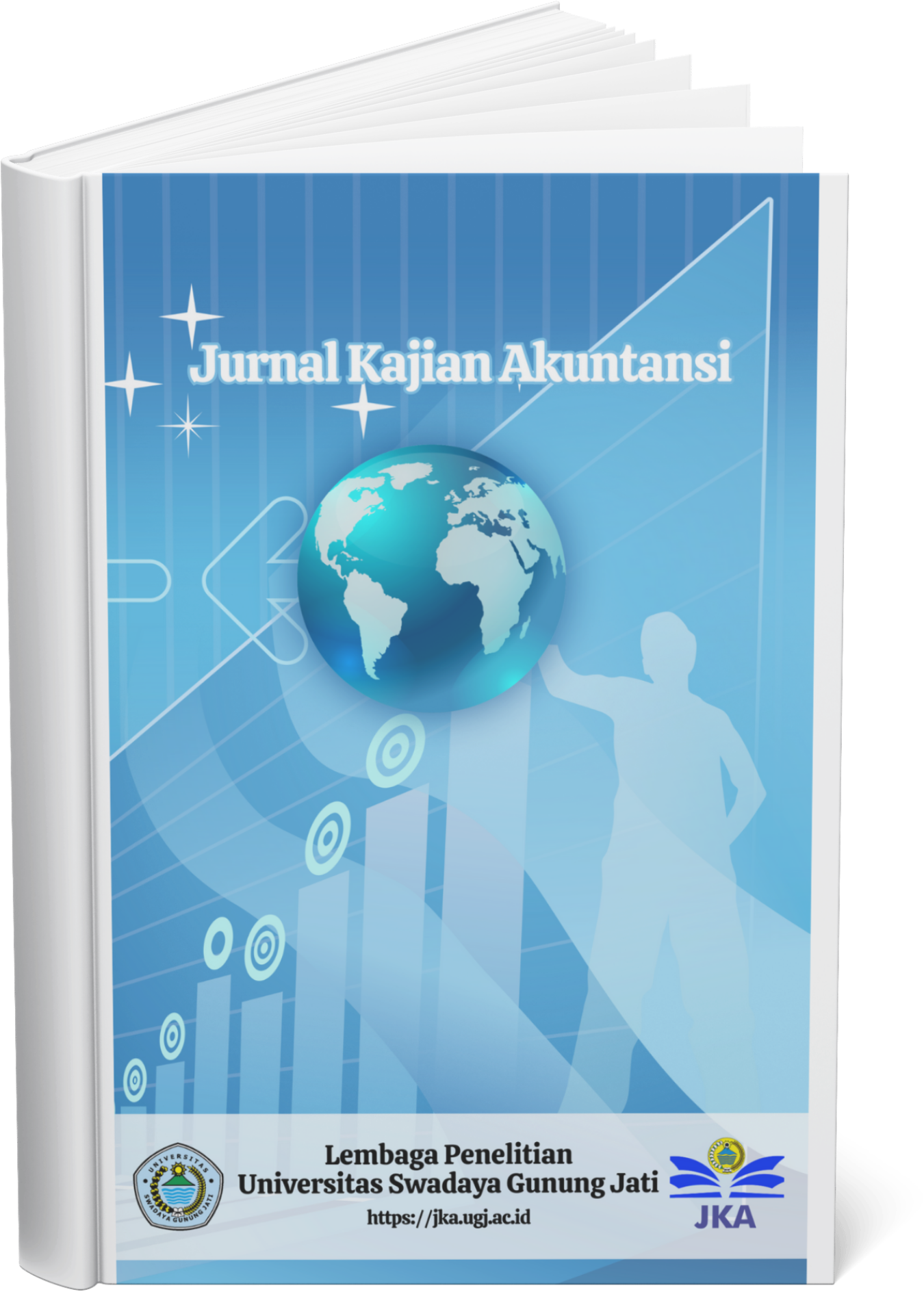Peran Komite Audit dalam Memoderasi Kecurangan Laporan Keuangan pada Perusahaan Publik di Indonesia
DOI:
https://doi.org/10.33603/jka.v9i1.9361Keywords:
Financial statement fraud, Financial stability, Personal financial needs, Auditor switch, Audit committeeAbstract
This research aims to investigate the impact of financial stability, personal financial needs, and auditor turnover on financial statement fraud measured using the F-Score Model, while considering the role of the audit committee in preventing financial statement fraud. The research employs a causal approach with hypothesis testing. Secondary data are used, so the population in this study consists of manufacturing companies listed on the Indonesia Stock Exchange for the period 2019-2022. Purposive sampling method is employed, resulting in 63 companies with 252 units of analysis, namely financial statements. The results indicate that financial stability, personal financial needs, and auditor turnover significantly affect financial statement fraud. Meanwhile, the audit committee is able to moderate the relationship between financial stability, personal financial needs, and auditor turnover on financial statement fraud. These outcomes have crucial implications for understanding the dynamics of financial statement fraud and directing prevention and handling efforts more effectively in the future.
References
Amalia, R., & Annisa, D. (2023). Pengaruh fraud pentagon terhadap kecurangan laporan keuangan dengan komite audit sebagai variabel moderasi. Journal of Applied Managerial Accounting, 7(1), 143–162. https://doi.org/10.30871/jama.v7i1.5156.
American Institute of Certified Public Accountants. (2002). Statement on auditing standards No. 99: Consideration of fraud in a financial statement audit. https://www.aicpa.org/content/dam/aicpa/research/standards/auditatest/downloadabledocuments/sas-0099.pdf.
Anggarani, D., Delfiana, P. W., Hasan, K., & Purnomowati, W. (2023). Analisis pengaruh fraud triangle terhadap laporan keuangan (Studi kasus perusahaan properti di Bursa Efek Indonesia tahun 2018–2020). Jurnal Akuntansi STIE Muhammadiyah Palopo, 9(1), 80–95. https://doi.org/10.35906/jurakun.v9i1.1298.
Elder, R. J., Beasley, M. S., & Arens, A. A. (2011). Auditing dan jasa asuransi: Pendekatan terintegrasi (Ed. ke-15). Penerbit Erlangga.
Faidah, A., Hendra, J., & Rustianawati, M. (2023). Faktor-faktor risiko fraud triangle yang mempengaruhi financial statement fraud. JUMAD: Journal Management, Accounting, & Digital Business, 1(1), 61–70. https://doi.org/10.51747/jumad.v1i1.1317.
Fatharani, N. A., & Purnamasari, P. (2023). Pengaruh personal financial needs dan financial stability terhadap kecurangan laporan keuangan. Bandung Conference Series: Accountancy, 3(2), 783–790. https://doi.org/10.29313/bcsa.v3i2.7802.
Fauziati, P., Hamdi, M., Karimi, K., Rahmawati, N., & Husna, N. (2023). Pengaruh perspektif fraud triangle terhadap kecurangan laporan keuangan. Jurnal Lentera Akuntansi, 8(1), 226–240. https://doi.org/10.34127/jrakt.v8i1.854.
Ikatan Akuntan Indonesia. (2018). Standar akuntansi keuangan per 1 Januari 2018. Penerbit IAI.
Ikatan Akuntan Publik Indonesia. (2014). SA 240: Pertimbangan atas kecurangan dalam audit laporan keuangan. http://spap.iapi.or.id/1/files/sa%20200/sa%20240.pdf.
Komite Nasional Kebijakan Governance. (2006). Panduan praktis tata kelola perusahaan bagi perusahaan terbuka di Bursa Efek Indonesia.
Theodorus M.Tuanakotta, Akuntansi Forensik Dan Audit Investigatif, Penerbit Salemba Empat, 2010.
Larasati, T., Wijayanti, A., & Maulana, A. (2020). Keahlian keuangan komite audit dalam memoderasi pengaruh fraud triangle terhadap kecurangan laporan keuangan. Jurnal Syntax Transformation, 1(8), 541–553. https://doi.org/10.46799/jst.v1i8.128.
Mahardhika, E., & Sari, M. P. (2022). Peran audit committee dalam memoderasi pengaruh faktor hexagon fraud theory terhadap fraudulent financial statement pada perusahaan pertambangan terdaftar Bursa Efek Indonesia 2018–2020.
Nurhasanah, S., Purnamasari, P., & Hartanto, R. (2022). Pengaruh fraud triangle theory terhadap kecurangan laporan keuangan dengan komite audit sebagai variabel moderasi. Bandung Conference Series: Accountancy, 2(2), 1040–1048. https://doi.org/10.29313/bcsa.v2i2.2910.
Purnama, S. I., & Astika, I. B. P. (2022). Financial stability, personal financial need, financial target, external pressure dan financial statement fraud. E-Jurnal Akuntansi, 32(1), 3522–3536. https://doi.org/10.24843/eja.2022.v32.i01.p15.
Puteri, N. N. (2023). Fraudulent financial statements analysis using hexagon fraud approach with audit committee as moderating variable. International Journal of Business and Management Invention, 12(1), 35–48. https://doi.org/10.35629/8028-12013548.
Rezaee, Z., & Riley, R. (2010). Financial statement fraud: Prevention and detection (2nd ed.). Wiley.
Riswandi. (2019). Pengaruh financial stability dan personal financial need terhadap financial statement (Studi pada perusahaan manufaktur sektor food and beverage di Bursa Efek Indonesia periode 2014–2018). Unpublished manuscript, 1–28.
Rizkia, P., Azin, D. M., & Umar, H. (2023). Pengaruh fraud star terhadap fraudulent financial statement dengan komite audit sebagai variabel moderasi (Studi empiris pada perusahaan manufaktur yang terdaftar di Bursa Efek Indonesia periode tahun 2016–2020). Jurnal Riset Perbankan, Manajemen dan Akuntansi, 7(1), 10–22.
Santoso, S. H. (2019). Fenomena kecurangan laporan keuangan pada perusahaan. Jurnal Magister Akuntansi Trisakti, 6(2), 173–200.
Sari, M. P., Mahardika, E., Suryandari, D., & Raharja, S. (2022). The audit committee as moderating the effect of hexagon’s fraud on fraudulent financial statements in mining companies listed on the Indonesia Stock Exchange. Cogent Business & Management, 9(1), 2150118. https://doi.org/10.1080/23311975.2022.2150118.
Sekaran, U., & Bougie, R. (2018). Research methods for business: A skill-building approach (7th ed.). Wiley.
Skousen, C. J., & Twedt, B. J. (2009). Fraud in emerging markets: A cross-country analysis. Social Science Research Network, 1–26. https://doi.org/10.2139/ssrn.1440630.
Suwarni, E., Subroto, B., & Irianto, G. (2012). Eskalasi komitmen individu berdasarkan. Jurnal Ekonomi dan Keuangan, 17(80), 430–450.
Theodorus, M. T. (2010). Akuntansi forensik dan audit investigatif. Penerbit Salemba Empat.
Downloads
Published
How to Cite
Issue
Section
License
Copyright (c) 2025 Jurnal Kajian Akuntansi

This work is licensed under a Creative Commons Attribution-ShareAlike 4.0 International License.
- Authors retain copyright and grant the journal right of first publication with the work simultaneously licensed under a Creative Commons Attribution-ShareAlike (CC-BY-SA 4.0) that allows others to share the work with an acknowledgment of the work's authorship and initial publication in this journal.
- Authors are able to enter into separate, additional contractual arrangements for the non-exclusive distribution of the journal's published version of the work (e.g., post it to an institutional repository or publish it in a book), with an acknowledgment of its initial publication in this journal.
- Authors are permitted and encouraged to post their work online (e.g., in institutional repositories or on their website) prior to and during the submission process, as it can lead to productive exchanges, as well as earlier and greater citation of published work.
